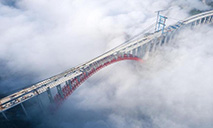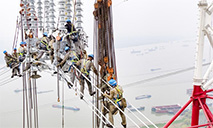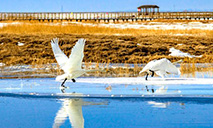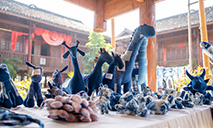Aussie Paralympic duo happily bask in memories of Beijing
SYDNEY, March 20 (Xinhua) -- Australian athlete Patrick Jensen's optimistic nature has taken him a long way - most recently to the Beijing 2022 Winter Paralympics where he competed in a range of Para-Alpine ski events for the visually impaired.
Now back at home in the New South Wales' (NSW) seaside town of Newcastle, Jensen happily recounts with experiences in China's snowy mountainsides earlier this month at his second Paralympics.
"Beijing, for me, was just a whole lot of fun," he told Xinhua in a recent interview. "I really enjoyed the whole environment, and everyone was just so nice ... and I love Chinese food."
Jensen's indefatigable personality helps explain how he has triumphed over some potentially soul-crushing challenges throughout his 26 years.
The Paralympian was diagnosed at the age of seven with a congenital eye disease which inevitably closed many options for him but ultimately steered him towards Para-Alpine skiing.
In his final year of school in 2013, a career advisor urged a somewhat sceptical Jensen, who had always been fit but not too sports-minded, to try out some winter sports at a training camp for athletes with disabilities.
"It all happened really quickly," Jensen said, recounting his instant affinity and natural talent for skiing, which within months had earned him a place on the Australian team at the International Paralympic Committee's (IPC) Alpine Skiing World Cup in the snow fields of NSW.
"I think it's the sense of freedom that I get while skiing," Jensen said, describing the exhilaration of racing down slopes at speeds of up to 100km/h.
"As a disabled person, you tend to get sheltered a lot, like not being able to drive. But once you clip your skis on, you can go as fast as you want and no one's stopping you. It's an awesome feeling of freedom, adrenaline, fear and excitement, all those things."
It is a sport, however, that calls for keen eyesight which means visually-impaired Para-Alpine skiers must rely on quick-thinking sighted guides who provide a stream of instructions as they hurtle through an event.
Each sighted guide leads the way for their partner with the two communicating via Bluetooth devices in their helmets.
"We work on an amazing amount of trust," Jensen said of his relationship with his guide Amelia Hodgson, whom he has been with since 2019.
"So basically, Amelia skis just ahead of me and she tells me when to turn left or right, so as to avoid any bumps or holes in the snow.
"My job is to listen and do exactly what she tells me to do," he said. "I mean, she's basically getting me from A to B as safely and as quickly as possible."
Hodgson, who spoke to Xinhua on Friday, described her job as being "super exciting ... but stressful".
"There's the pressure of leading someone into either success or crashing, so that's pretty intense," the 25-year-old said.
Hodgson, who is also a ski instructor and coach, said there was a strong communication bond between Jensen and herself.
"We like to chat a lot as friends," she said, adding that having a deep trust and understanding was important when split-second decisions were being made.
Describing the different impacts of their symbiotic teamwork, Hodgson said she thought competing was "probably more physically exhausting for Pat because he has to react really fast with his body".
"But, I think, for me, it's more mental ... my brain feels very tired after an event."
Photos
Related Stories
- Meet the designer who made Chinese athletes shine at opening ceremony of Beijing 2022
- Commentary: Beijing 2022 Olympics, Paralympics raise the bar for future Games
- Photo story: visually impaired girl plays Beijing 2022 theme song Snowflake
- Experts: Beijing 2022 epitomized 'shared future' motto
- Interview: Japanese luger Kobayashi eyes gold medal in 2030 after Beijing letdown
Copyright © 2022 People's Daily Online. All Rights Reserved.










